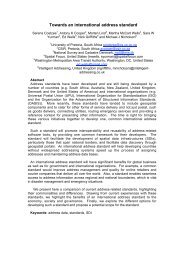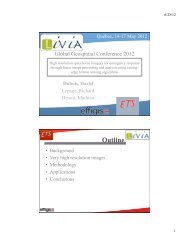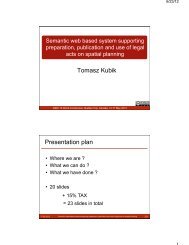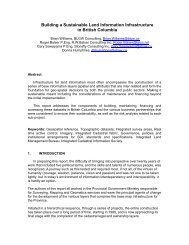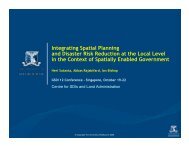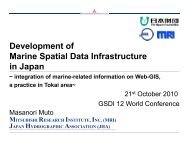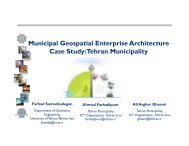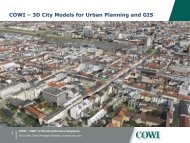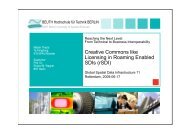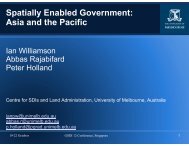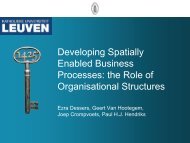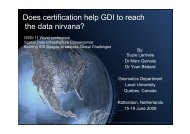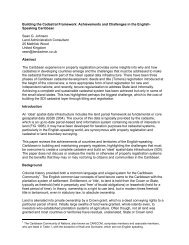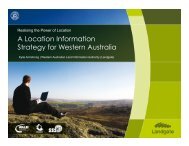SDI Convergence - Global Spatial Data Infrastructure Association
SDI Convergence - Global Spatial Data Infrastructure Association
SDI Convergence - Global Spatial Data Infrastructure Association
Create successful ePaper yourself
Turn your PDF publications into a flip-book with our unique Google optimized e-Paper software.
3.3 International activities on managing use rights of geographic information<br />
Worldwide, many activities are focusing on the management of use rights linked to<br />
geographic information and on instruments to express use conditions. In recent years,<br />
in the GeoDRM environment, the main activities are emerging in the Open Geospatial<br />
Consortium, in the ISO TC211 Geographic Information/Geomatic and in the Rights Expression<br />
Languages (RELs).<br />
Open Geospatial Consortium (OGC) is a non-profit international organisation “leading<br />
the development of standards for geospatial” information and services (OGC web site).<br />
By 2004, the OGC established a GeoDRM working group with the mission of coordinating<br />
work done on digital rights management. The main objectives are to implement<br />
business models on use rights for web-based services (software components accessible<br />
over the web for use in other applications) and to develop OGC specifications and<br />
technologies required for GeoDRM. During 2007, GeoDRM working group activities<br />
had lead to the drawing up of the Geographic Digital Rights Management Reference<br />
Model. The document is an abstract specification defining a conceptual model for digital<br />
rights management of geo information and requirements for rights management systems<br />
(OGC, 2007).<br />
The International Organization for Standardization (ISO) is the largest developer and<br />
publisher of International Standards, formed by a network of national standards Institutes.<br />
In the ISO context, the ISO/TC211 Geographic Information/Geomatics working<br />
group, responsible for the ISO geographic information standards, is developing an Item<br />
proposal – “Rights expression language for geographic information” (2007) - on a<br />
Rights Expression Language, to be used to compose digital licences for geographic<br />
information. A REL is a language that expresses rights related to a specific resource: in<br />
the digital rights management sense it is a formal language that can be executed as an<br />
algorithm. The GeoREL is an extension of a rights expression language in the GI field,<br />
which defines an authorisation model to specify the semantics of a set of rights expressions,<br />
given on specified resources. The Item proposal on GeoREL has been created<br />
using the Geographic Digital Rights Management Reference Model, drawn up by the<br />
OGC GeoDRM working group.<br />
3.4 European legal context of use, diffusion and reuse of digital information<br />
Public authorities produce large amounts of digital information, called public sector information,<br />
such as maps, meteorological, legal and business information. Most of this<br />
digital information has commercial potential for reuse. In fact, a growing number of<br />
companies are reusing public sector information to create new added-value products<br />
and services. In Europe, two specific Directives regulate use, sharing and reuse of digital<br />
content produced by public authorities: the Directive on public access to environmental<br />
information (2003/4/EC) and the Directive on the reuse of public sector information<br />
(PSI Directive, 2003/98/EC).<br />
Directive 2003/4/EC requires Member States to make actively available and disseminate<br />
environmental information. It guarantees the right of access to environmental information<br />
produced or received by a public authority, in order to achieve the widest dissemination.<br />
The PSI Directive, instead, establishes a set of rules to regulate the reuse<br />
of existing information held by public sector bodies. These documents can be reused<br />
for commercial or non-commercial purposes, and public authorities may make available<br />
their documents for reuse through a licence. Member States may adopt standard licences,<br />
processed electronically and available in digital format.<br />
56



